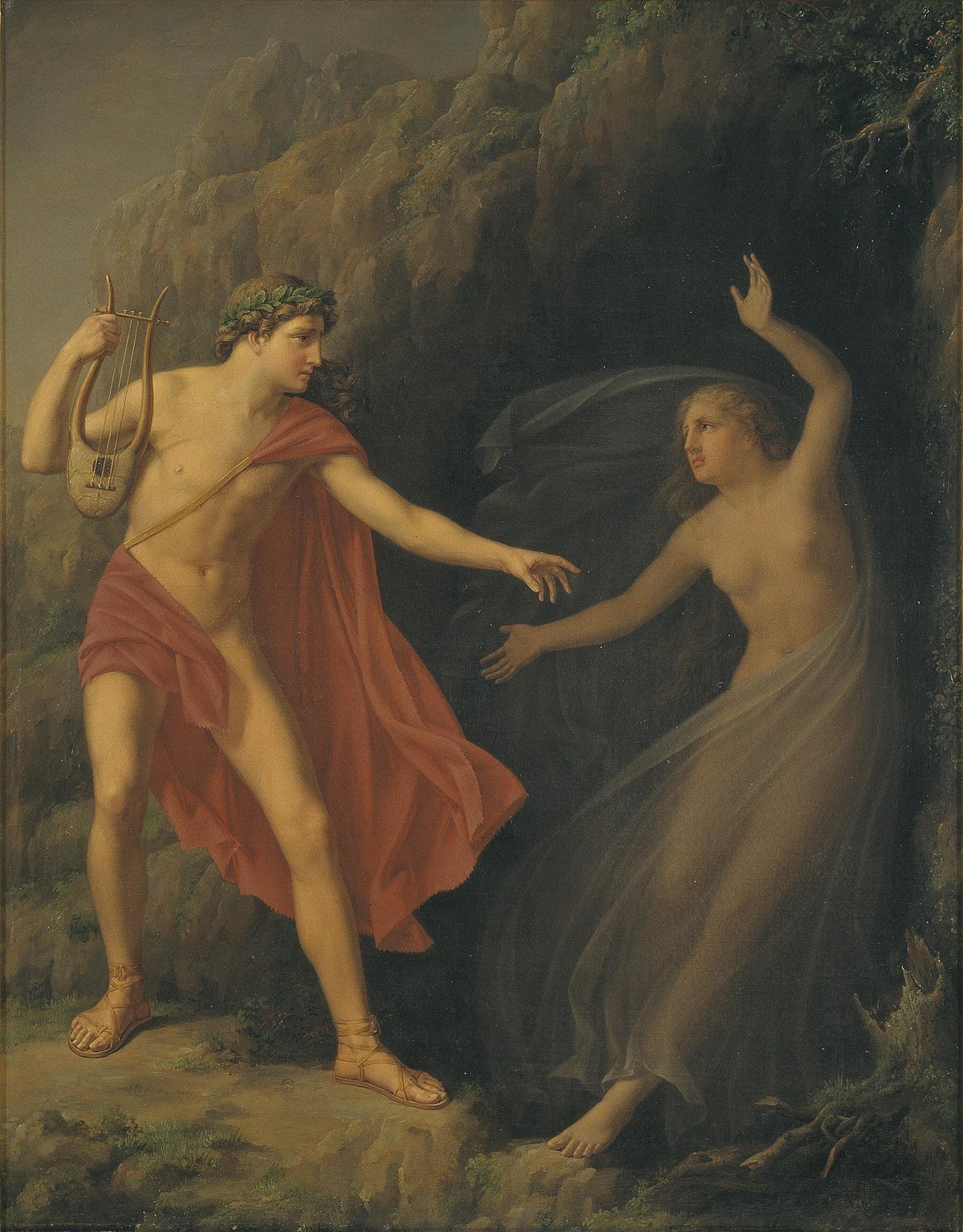Don’t Look Back in Anger: Orpheus and Eurydice
Orpheus and Eurydice, Carl Goos, 1830 C.E
Throughout the ages, the gods have loved to test humans. One test that interestingly appears again and again in mythology and scripture is the challenge of not looking back.
Most people will probably be familiar with the story of Lot’s wife from the old testament. After the destruction of Sodom and Gomorrah, Lot and his family were instructed to flee and not look back at the city they had once called home burning behind them. They all abide, except Lot’s wife, who turns around, and is promptly transformed into a pillar of salt.
An example of a similar story from Greek mythology is Baucis and Philemon. In Ancient Greek culture, “xenia,” meaning hospitality to strangers, was a sacred value. According to myth, one day, Zeus and his son Hermes decided to test out this value among some unsuspecting villagers. Disguised as poor travelers, they went from house to house requesting food and shelter. They were turned away from everywhere, except Baucis and Philemon’s. Even though Baucis and Philemon were the poorest in the village, they fed, wined and watered Zeus and Hermes, and even slaughtered their last goat to make a hearty supper.
When the gods revealed themselves, they told Baucis and Philemon that they were impressed with them, but disappointed in everyone else. They instructed the kindly couple to leave the village, which they were about to destroy. They told them to climb the hill, and not look back. Of course, we know what happened next. Baucis and Philemon climbed the hill, but hearing the screams and destruction behind them, they couldn't help themselves but look back. They were swiftly transformed into a pair of trees; an oak and a linden, as they remain to this day.
This lesson in not looking back is one that appears time and time again. But the most romantic version of this trope is undoubtedly the story of Orpheus and Eurydice. Orpheus’ immeasurable love for his beautiful wife, Eurydice drives him to great despair when she is bitten by a viper and meets her untimely demise shortly after their marriage. In his utter anguish and despondency, he travels to the underworld to attempt to use his musical talents to charm Hades and Persephone, king and queen of the dead, into returning Eurydice to the mortal plane. It seems he has been successful when the dread couple agree: Hermes will guide them back to the surface, all Orpheus has to do is not look back until both he and Eurydice have traveled the long, dark, winding path back to the world of living.
They set off, but as they walk, Orpheus hears only one set of footsteps behind him. Overcome with doubt that his wife isn’t following, Orpheus glances over his shoulder. He sees the dead Eurydice in Hermes’ arms, and, Orpheus having broken his contract with Hades and Persephone, she disintegrates before his eyes.
These stories are often taught as lessons in what happens to those who are too concerned with worldly possessions and desires, instead of faith and salvation – or, examples of the price of disobeying the gods, who seem to enjoy imposing arbitrary restraints upon their subjects.
However, I believe these stories, at their core, are about the human condition; they demonstrate that mortals cannot escape, outsmart, or change their ultimate fate – that having free will, and therefore the freedom to choose – includes the freedom to choose wrongly. Neither great intellect, kind hospitality nor extraordinary talent can make a mortal immortal. Limitations are part of our condition.
The closest Orpheus comes to immortality, the reason we know his name today, is his gift of music. This is what enables him to charm the all-powerful gods Hades and Persephone. But he is his own undoing – his human doubt, and love for Eurydice, moves him to turn around, breaking his oath and ultimately costing him everything – except, perhaps, his place among the stars (or at least, his lyre’s place) and in mythology. Would we know his story today if he had not looked back and he and Eurydice had lived happily ever after? The same applies to Lot’s nameless wife, and Baucis and Philemon – their decisions, though seemingly the wrong ones, are what in a sense earn them their immortality, or the closest to it they will come.
This entire theme in comparative mythology echoes back to the concept of original sin in the old testament. When Eve eats the apple from the Tree of the Knowledge of Good and Evil, she gains free will (although arguably she already had it, because she chose to eat the apple). The argument between Lucifer and god which leads to their messy divorce is about whether or not humans should have this ability. A comparable figure in Greek mythology might be Prometheus, who defies Zeus in giving humans fire, the arts and enlightenment.
What do you think? Is it important to have the choice, even if you choose wrongly? And given that we are still telling their stories millenia later, should Orpheus, Eurydice, Lot’s wife, Baucis and Philemon now be looking back in anger?

